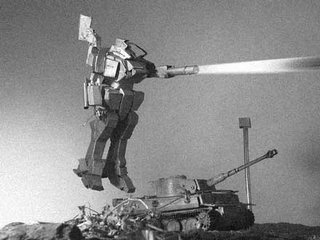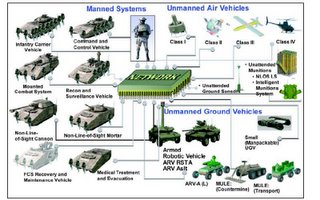
Deputy Secretary of Defense Gordon
So Tom what are you complaining about, you might ask. Our honored soldiers have been fighting a war without adequate manpower or equipment, with billions of dollars and scores of our bravest ticking away each month, but it seems the pentagon has finally acknowledged its misplaced priorities. If this directive is implemented, it might shake some feathers over at DoD and start shifting some of their immense wealth away from ineffective missile defense systems and towards body armor, humvee equipment, and square one for any army: boots on the ground.
Alas, as predictable as death and taxes, this is merely one more misdirection from the
Of course, that’s assuming the Pentagon lions actually care about the common soldier. The Army praises their big ticket Future Combat Systems extensively on their website:
“Lessons learned in Operation Iraqi Freedom and the Global War on Terrorism have shown that a joint, combined arms, network centric force has the ability to both rapidly defeat an enemy in battle and act as a key element in follow-on peacekeeping efforts.”
Is that really what these two conflicts have taught us? First of all, I wouldn’t say we’ve achieved victory in
These observations lead us to Congress’ Defense Appropriations Bill for 2006. Passed last month, Congress didn’t cut back on a single big ticket program. We might be in the midst of a federal budget crisis with fiscal conservatives finally beginning to call for spending reductions, but rest assured we’ll spend $76.54 billion on procurement and $72.13 billion on R & D. We might have dominated the skies for ten years with jets that fly faster, longer, and are more maneuverable with greater firepower and range, but I think we need 25 F/A-22 Raptors that can do it invisibly; all for a measly $3.2 billion. How about another $8.8 billion for the defunct missile defense system? Meanwhile marines in
Of course I realize this is nothing new. President Eisenhower warned us in his farewell speech to the nation of the dangers of the military-industrial complex, an inevitable scenario that has deteriorated perhaps even beyond Eisenhower’s imagination. But President Eisenhower also called for a vigilant public:
“Only an alert and knowledgeable citizenry can compel the proper meshing of the huge industrial and military machinery of defense with our peaceful methods and goals, so that security and liberty may prosper together.”
So let’s keep our eyes open for malfunction and misuse, as futile as our efforts for change might seem. No one can change all the sad injustices of this world, but there’s something about those sad songs that make me keep singing them.


0 Comments:
Post a Comment
<< Home